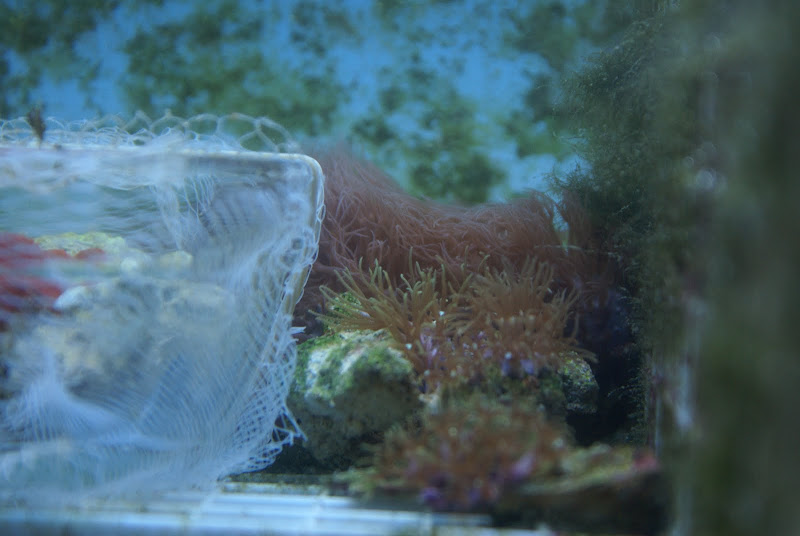Briareum sp (Starburst Polyps)
Thierry's Forum :: Aquarium :: Fragment Tank 60L :: Corals
Page 1 of 1
 Briareum sp (Starburst Polyps)
Briareum sp (Starburst Polyps)
Source: liveaquaria.com
QUICK STATS
The Starburst Polyps are also referred to as Star, Eight Tentacle, Mat, or Daisy Polyps. They are usually white or brown with a white dot in the center of each polyp, although, some more rare Starburst Polyps are green. The green specimens have been called Clavularia viridis; however, they are now identified as a Briareium sp. They have the distinctive eight-leaved tentacles on each polyp. They are colonial animals with several individual polyps attached to a piece of live rock.
Accurately described as an encrusting coral, Starburst Polyps rapidly grow over adjacent rock work, coral, or even the glass of an established reef aquarium. They are a peaceful coral armed with the defensive capability of being able to retract or deflate each of their polyps in response to predation. They will not harm other corals that are placed close to their colony, but are susceptible to being damaged by any aggressive corals in the reef aquarium. They are easy to maintain in the reef aquarium and make an excellent candidate for the beginning through expert reef aquarist. They require a medium to high light level combined with a medium to strong water movement within the aquarium. For continued good health, they will also require the addition of iodine and other trace elements to the water.
The experienced hobbyist cultures the colony by taking a cutting from their encrusting base. The cutting is then glued to a hard substrate such as a rock or dead coral head.
The symbiotic algae zooxanthellae hosted within their bodies provide the majority of their nutritional requirements through photosynthesis. They also benefit from weekly feedings of micro-plankton or foods designed for filter feeding invertebrates.
QUICK STATS
- Care Level: Easy
- Temperament: Peaceful
- Lighting: Moderate to High
- Waterflow: Medium to Strong
- Placement: Middle to Top
- Water Conditions: 72-78° F, dKH 8-12, pH 8.1-8.4, sg 1.023-1.025
- Color Form: Green, Tan, White
- Origin: Central Pacific, Eastern Asia, South Asia
- Family: Briareidae
- Insert Date: 31 May 2011
The Starburst Polyps are also referred to as Star, Eight Tentacle, Mat, or Daisy Polyps. They are usually white or brown with a white dot in the center of each polyp, although, some more rare Starburst Polyps are green. The green specimens have been called Clavularia viridis; however, they are now identified as a Briareium sp. They have the distinctive eight-leaved tentacles on each polyp. They are colonial animals with several individual polyps attached to a piece of live rock.
Accurately described as an encrusting coral, Starburst Polyps rapidly grow over adjacent rock work, coral, or even the glass of an established reef aquarium. They are a peaceful coral armed with the defensive capability of being able to retract or deflate each of their polyps in response to predation. They will not harm other corals that are placed close to their colony, but are susceptible to being damaged by any aggressive corals in the reef aquarium. They are easy to maintain in the reef aquarium and make an excellent candidate for the beginning through expert reef aquarist. They require a medium to high light level combined with a medium to strong water movement within the aquarium. For continued good health, they will also require the addition of iodine and other trace elements to the water.
The experienced hobbyist cultures the colony by taking a cutting from their encrusting base. The cutting is then glued to a hard substrate such as a rock or dead coral head.
The symbiotic algae zooxanthellae hosted within their bodies provide the majority of their nutritional requirements through photosynthesis. They also benefit from weekly feedings of micro-plankton or foods designed for filter feeding invertebrates.

thierry- Posts : 2238
Join date : 2009-08-18
Age : 42
Location : Zoetermeer
 Current location
Current location
This rock is still located in the RSM between the mushroom rocks

thierry- Posts : 2238
Join date : 2009-08-18
Age : 42
Location : Zoetermeer
 Sold Kenya Tree + Polyps
Sold Kenya Tree + Polyps
This rock is the one on the left in the picture



thierry- Posts : 2238
Join date : 2009-08-18
Age : 42
Location : Zoetermeer
 Cleaning
Cleaning
Moved this rock to the top shelf as the right one in the back


thierry- Posts : 2238
Join date : 2009-08-18
Age : 42
Location : Zoetermeer
 Similar topics
Similar topics» Briareum sp (Starburst Polyps)
» Briareum sp (Starburst Polyps)
» Briareum sp (Starburst Polyps)
» Briareum sp (Starburst Polyp)
» Briareum sp (Starburst Polyps)
» Briareum sp (Starburst Polyps)
» Briareum sp (Starburst Polyps)
» Briareum sp (Starburst Polyp)
» Briareum sp (Starburst Polyps)
Thierry's Forum :: Aquarium :: Fragment Tank 60L :: Corals
Page 1 of 1
Permissions in this forum:
You cannot reply to topics in this forum